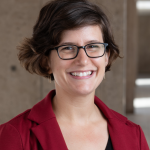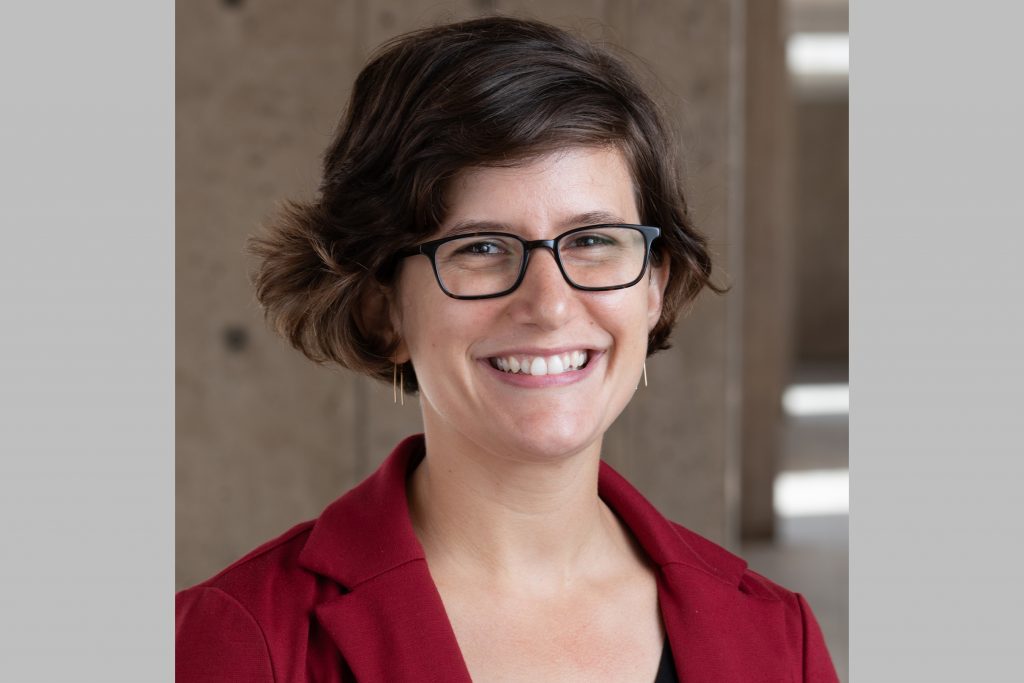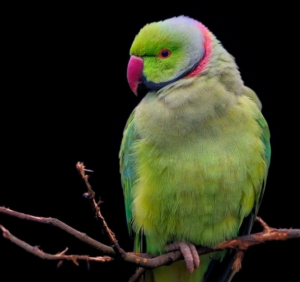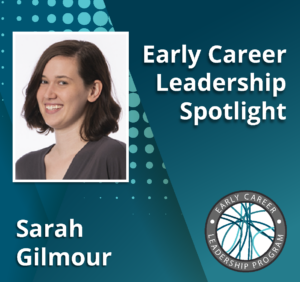We’re taking time to get to know the members of the GSA’s Early Career Leadership Committees. Join us to learn more about our early career scientist advocates.

Molly Matty
Career Development Subcommittee
Molecular Neurobiology Labs, Salk Institute for Biological Studies
Postdoctoral Research Fellow
Research Interest
I am interested in host-microbe interactions. The profound effects microscopic organisms such as bacteria and viruses can have on the life of much larger and seemingly more complex species such as humans is absolutely astonishing. From probiotics to pandemics, we spend our entire lives with microbes.
In graduate school I used zebrafish as a model system to explore the immune response to mycobacterial infection, an infectious bacterium that causes tuberculosis in humans. Tuberculosis kills almost 2 million humans every year and is such an effective pathogen because of its ability to manipulate its host. In both humans and zebrafish, these infectious mycobacteria evade, subvert, and alter host immune processes in order to survive, replicate, and move to another host. In order to study this behavior, I took a chemical screening approach to modulate host signaling to reduce infection in order to find drugs that could undo these microbial tricks in zebrafish larvae. Using a combination of genetics, ex-vivo modeling, and microscopy, I found that an FDA-approved drug could potentiate host responses to control mycobacterial infection in zebrafish. Through this work and a collaboration with a fellow graduate student, I became interested in how even non-pathogenic bacteria manipulate their hosts. I wanted to continue working with projects where I could work with a model system, use complex microscopy, and create tools to understand how tiny microbes can have such huge effects on life as we know it.
After my single pathogen-centered PhD work, I wanted to focus on communities of non-pathogenic microbes. Every organism has a microbiome consisting of bacteria, fungi, and viruses which are necessary for life, from digestion to immunity. The microbiome found in the gut can influence health and disease, from metabolism and diabetes to irritable bowel syndrome and infection. However, scientists have only recently started characterizing the impact of gut microbes on behavior and neuronal signaling in insects and mammals, including humans. This complex interplay is often referred to as the microbiome-gut-brain-axis.
I am exploring the role of the gut microbiome on Caenorhabditis elegans behaviors. C. elegans are an excellent model organism for studying behavior due to their relatively simple nervous system yet complex behavioral repertoire. Because C. elegans eat bacteria as food, I can easily manipulate their gut bacterial microbiome in a laboratory setting. I’m aiming to uncover critical components of the C. elegans microbiome-gut-brain interactions through genetic manipulations to uncover the genetic basis for microbiome-induced behavioral changes, neuronal imaging to observe neural activity under different microbiome conditions, and behavioral assays to characterize the breadth of observable changes upon gut colonization with diverse bacterial species. Through my research, I hope to uncover how gut microbes manipulate behaviors associated with anxiety and social behaviors.
As a PhD-trained scientist, you have many career options. What career paths interest you the most?
My first scientific inspiration was my mom, a small-town biology teacher. She let me dissect flowers, dried sea stars, and owl pellets to look at their insides under a microscope. She turned boring textbook memorization into hands-on, fun, real-life experiences. Because of her influence, I knew I wanted to be a teacher. Unfortunately, a man whose opinion I mistakenly valued told me, “Those who can’t do, teach.” I was encouraged by my undergraduate research mentor to get a PhD, something I hadn’t even heard of before going to college. I convinced myself that I would find a career that would interest me more than teaching through my advanced scientific training.
During my PhD, I went to nearly every “Career Development” workshop, panel, and seminar available. I listened to medical science liaisons, policy makers, intellectual property lawyers, biotech startup CEOs, and science writers talk about their careers in earnest. While I loved hearing about their experiences and the resources they used to be successful in their journeys, I noticed that I was more interested in sharing my new network, the resources I found, and the personal stories of the panelists with my colleagues. I wanted to take what I had learned and help my fellow graduate students identify their career goals.
I take a similar approach to doing and learning science. I like making a personal connection with the science and the scientists performing it. This is because the output of our experiments is not what intrigues me most, but rather the process by which we grow from the experiences and new-found knowledge. For me, the process of an individual or group advancing their understanding is fascinating. Given these traits, you can probably guess that I still want to be a teacher. My career goal is to serve as a faculty member at a primarily undergraduate institution (PUI) and work with undergraduates to develop their research skills, explore science, and support their professional development. I have a deep interest in my favorite fields of science (microbiology, innate immunity, and genetic tools in model organisms), and I want to continue to explore these fields through the lens of the scientific process and the personal stories of the scientists doing the work. I will engage with my colleagues and students through excitement and enthusiasm, just as my mother did.
In addition to your research, how else do you want to advance the scientific enterprise?
I want to increase honesty and equity in academic science. I don’t mean preventing data manipulation (which is important!), but rather the honesty we express in our interactions with ourselves and with our colleagues. We hear about “imposter syndrome” a lot in the sciences, especially as it relates to the graduate student experience. (Imposter syndrome is when a person feels they don’t belong because they perceive that everyone around them fits in or knows what they are doing, while they themselves do not.) Imposter syndrome negatively impacts a person’s perceived self-worth and identity. I think that scientists at all levels can combat this pervasive syndrome by being honest about our shortcomings.
My own experience with imposter syndrome began when I attended college with limited pre-existing cultural capital. I played catch-up for the next four years, formulating opinions on the history of the modern Middle East, classical literature, foreign films, and diverse musical genres. I was drawn to math and science because the concepts in both were new to everyone, and I didn’t need to have an opinion on it to understand it. This changed in grad school, where I was surrounded by students who were raised in academia, had opinions on which journals were reputable, and seemingly knew the names of the authors on every paper. This is what I’ve come to call “scientific cultural capital.” I would nod along and pretend like I knew who Bonnie Bassler was or how an R01 meant something different than R1. There were first-year graduate students who would introduce themselves and say matter-of-fact statements like “I’ve always been really interested in how alpha-satellite DNA influences centromere structure.” After openly admitting to a classmate that I had no idea what I was “always interested in” or what journal I wanted to submit my work to, I found that they shared the same feelings. We became friends, confidants, and peers.
I now want all of us scientists to have honest conversations about what we know and do not know about our science and career trajectories. It is only when we share what we don’t know that we can have space to learn. When we are honest about our life’s trajectory and shortcomings, we create open spaces. As academics, we need to create more welcoming spaces for first-generation scientists, Black and Indigenous scientists, scientists of color, scientists with disabilities, LGBTQIA+ scientists, and other historically under-represented people in academic science.
I am working to achieve these goals of equity and honesty in science through active mentorship with young scientists and by building opportunities for peer networking with like-minded scientists. I have started a small mentorship program called Virtual Active Science Engagement (VASE) in which I foster the development of both soft and tangible science skills with a group of about 15 undergraduates from across the country. Our weekly meetings include journal clubs, discussions about graduate school, and presentations by scientists in a variety of academic and non-academic careers. These young scientists are encouraged to interact with each other, ask for help, and identify their strengths and weaknesses—all while honing in on their specific research/career interests through investigating scientific literature. I spend about 16 weeks with these students to give them the skills necessary to set out onto their scientific adventures with confidence, tools to succeed, and a network of peers to reach out to in the future. I plan to take the lesson plans I’ve developed in VASE and turn it into an undergraduate course I’ll teach in the future. This curriculum serves to level the playing field in academic science, exposing all students to the hidden curriculum and “scientific cultural capital.” VASE seeks to create a sense of belonging in science, while empowering students to be honest and kind, to themselves and others, while creating a sense of belonging. When we all expose our inner “imposter” and confront our unknowns, we can make academic science more equitable.
As a leader within the Genetics Society of America, what do you hope to accomplish?
As co-chair of the Career Development Subcommittee, I believe our work has the ability to serve both our fellow early career scientists and ourselves. My mission as a leader within GSA is to help others achieve their goals. As co-chair, I have encouraged my fellow committee members to openly share their career ambitions, skills, and shortcomings with the group so that I am better equipped to help them achieve their goals.
As we’ve been developing programming this year, I am glad that I am not afraid of change. I’m very fortunate to work with a team of hard-working, introspective, collaborative women who are adapting to the unprecedented times of the year 2020. Within a single virtual meeting, we completely reorganized our biggest event of the year and created a highly successful virtual event with hundreds of engaged attendees.
As a leader, I aim to empower others to think critically about the “what” and “why” behind the work they’re doing so that their work and efforts are honest, equitable, and in the service of themselves and others. This means developing programs that are mutually beneficial. We are working toward developing career skills that are often left out of standard graduate and postdoctoral training, such as working on a team virtually, interviewing scientists, writing promotional materials, organizing seminars, creating accessible content, and collaborating with larger organizations. As I develop these skills, I am gaining confidence and in turn eliminating my imposter syndrome. As we work together, our shared experiences create a sense of belonging. We are building our peer network to include scientists from across the world. I am so fortunate to not only be building this community and gaining these skills for myself, but also creating content and programming to assist in demystifying career trajectory journeys for our fellow early career scientists. I plan to continue to evaluate the needs of our community and ensure that our programming matches their needs.
Previous Leadership Experience
- Society of Research Fellows, Chair, Salk Institute for Biological Studies
- Duke Outreach in Genetics and Genomics, Co-founder, Duke University
- Duke UPGG Graduate Student Representative, Duke University
- Duke Zebrafish Community, Chair, Duke University
- WKNC 88.1FM General Manager, North Carolina State University













